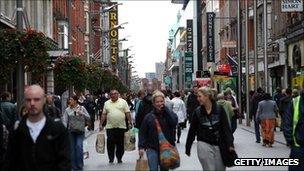OECD praises Irish Republic's spending cuts
- Published

The OECD has warned the Irish government to keep a close eye on high levels of unemployment
The Irish government has made "very sizeable" efforts to reduce its budget deficit, but risks remain due to the possible impact of the eurozone debt crisis, a report has said.
The study from the Organisation for Economic Co-ordination and Development (OECD) also said the Irish economy was now showing a "modest recovery".
It urged the Irish Republic to keep up efforts to cut public spending.
The country needed a 85bn euros ($113bn; £72bn) bailout last year.
It is now continuing to receive instalments of the loans package, which is led by the European Union (EU) and the International Monetary Fund (IMF).
The 85bn euros included a £3.2bn loan from the UK.
The Irish Republic is one of three countries that have so far received EU and IMF funds, the others being Portugal and Greece.
The concern for the OECD and other observers, is that the eurozone debt crisis could spread to countries such as Spain and Italy, and have a knock-on impact on the wider European economy.
'Unemployment risk'
The OECD predicts that the Irish economy will grow by 1.2% this year, following a contraction of 0.4% in 2010.
It also estimates that the Irish Republic will be able to reduce its budget deficit from 11.9% of the country's annual economic output (or GDP) in 2010, to 10% this year, 8.6% in 2012, and falling to 2.8% in 2015.
However, it cautioned that Dublin had to keep an eye on the unemployment situation.
"The risk is that joblessness becomes persistent, which could undermine the social consensus that is underpinning the economic and fiscal adjustments," said the OECD.
The Irish unemployment rate was 14.3% in September.
The Irish economy boomed in the decade until 2008, when it fell into recession as a result of the global credit squeeze. This caused an end to the cheap credit that had fuelled the unsustainable growth in its housing market.
In addition to the country needing an EU and IMF bailout, the government had to step in and support its indebted banks.